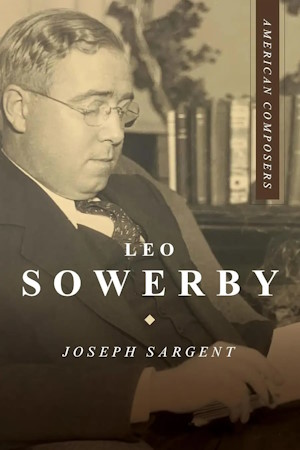
Leo Sowerby
by Joseph Sargent
184pp. Hardback
Published 2024
ISBN-13:978-0252045936
University of Illinois Press
Leo Sowerby was born on May 1, 1895 in Grand Rapids, Michigan and began composing aged only ten. Four years later he came to Chicago, where he studied composition with Arthur Olaf Andersen at the American Conservatory of Music. He himself joined the faulty there in 1924. In 1927 he became organist-choirmaster at the city’s St James’s Episcopal Church. He was the winner of the Pulitzer Prize for music in 1946 for his cantata the Canticle of the Sun, written two years earlier. In 1962, after his retirement from St James’s, he was called to Washington National Cathedral to become the founding director of the College of Church Musicians, a position he held until his death in 1968. His compositional oeuvre consists of over 500 works in every genre except opera and ballet.
This recently published biography of the composer, the first of its kind, scrutinizes Sowerby’s biography and oeuvre in the context of American music. In view of his “lengthy career across a wide panorama of secular and musical life”, the book aims to determine his place in American cultural history. The author is Joseph Sargent, who is assistant professor of music at the University of Alabama.
Sowerby didn’t align himself with any particular school. A shy, retiring and introverted man, he never promoted his own music. This, Sargent suggests, was in some way “incompatible with the aggressive pursuit of performance, publishing and recording opportunities”. Later in the book, the author identifies factors which contributed to Sowerby’s reputational decline. He was “unwilling to put in the necessary legwork to bolster his own reputation”. Organist E. Power Biggs, friend and colleague of the composer, commented in 1971 “…..nor did he choose to be involved in musical politics generally”. A former student Gail Quillman thought the composer’s enormous workload was a contributing factor.
With regard to Sowerby as choirmaster, his choir was made up of volunteers and paid singers. A taskmaster by all accounts, he excluded outsiders from rehearsals and docked the pay of latecomers. Micromanagement was his approach, maintaining a firm grip on everything from “the rapidly shifting tone colours of his organ music to directing even the spoken ‘Amens’ recited by the choir”.
He ate heartily at the Cliff Dwellers Club whilst at St. James. His over-indulgence and smoking contributed to health problems later in life. His homosexuality is sensitively discussed; there were several long-term romantic relationships with men in his choir.
Sowerby was a well-loved and respected teacher. In 1934 he became head of theory and composition at the American Conservatory, succeeding Arthur Olaf Andersen. It was a role which gave him a great deal of pleasure, and one which he took very seriously. He was criticized for spending too much time teaching. His pedagogy was traditional by nature. In his composition classes he “emphasized colourful harmony, clear structure and rich orchestration”. Many of his students were greatly indebted to him.
Sargent incorporates, within the biographical narrative, detailed analyses of Sowerby’s music, discussing form, harmony and structure. For those who read music, useful examples are given.
As the sole biography of the composer, this volume will be indispensable for devotees. It’s certainly an outstanding publication, wide and traversing, revelatory and penetrating. Joseph Sargent presents us with an impeccably and thoroughly researched biography, carefully analytical and elegantly presented. No stone has been left unturned in his endeavours. There are many black and white photographs scattered throughout the text. The extensive notes are situated at the end of the book, together with a useful appendix of suggested listening, and a splendid, comprehensive bibliography. Anyone who reads this book will come away feeling enriched and more appreciative of this gifted and enigmatic composer. This first class study is an absorbing read and well worth tracking down.
Stephen Greenbank
Buying this recording via a link below generates revenue for MWI, which helps the site remain free



















